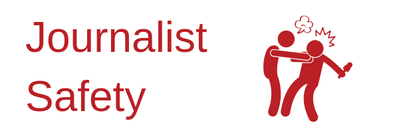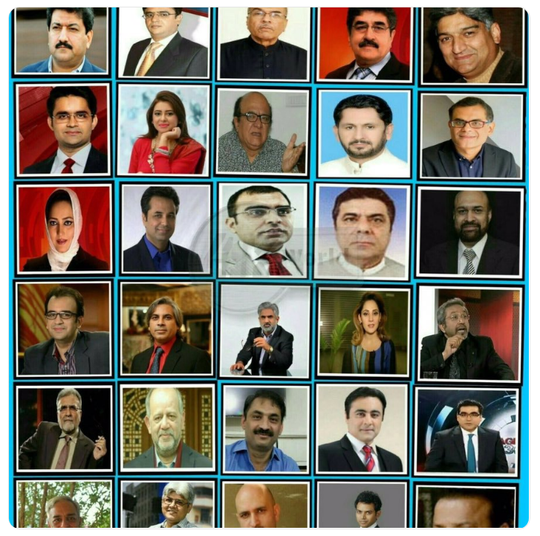
Pakistan exerts control over journalists and press freedom
Pakistan’s media environment remains hostile towards journalists and the press as ongoing violence and censorship dominated IFJ monitoring. In the past month, Pakistani journalists faced physical attacks, verbal threats, online harassment and murder. On the evening of June 12, senior Dawn journalist Baqir Sajjad was harassed by intelligence operatives after meeting diplomats from the British High Commission. On June 16, Muhammad Bilal Khan, a prominent 22-year-old blogger, was stabbed to death in Islamabad. He had more than 16,000 followers on Twitter, around 48,000 on his YouTube channel and 22,000 on Facebook. Khan was known for his criticism of the military and Pakistan’s intelligence agency, Inter-Services Intelligence (ISI). He was also known for bringing sensitive issues to light, particularly around religious issues.
IFJ has witnessed an increasingly controlled and censored broadcast media environment under the government of Prime Minister Imran Khan. Authorities have tightened the censorship and forced news channels cease reports and interviews on opposition politicians. Three television channels were taken off-air in the month. Pakistan’s media was also targeted in a Twitter hate campaign as against journalists seen as being “pro-India” and “anti-Pakistan”. The hashtag #ArrestAntiPakJournalists was accompanied with images of prominent Pakistani journalists, urging for them arrested or hung.
Read more here, here, here and here.

India: Kashmiri editor arrested for 27-year-old terrorism case
A Kashmiri editor was arrested in a late night raid on his home in Srinagar on June 24. The respected veteran editor of Daily Afaaq, Ghulam Jeelani Qadri, was taken from his home by police and arrested on a non-bailable warrant issued in relation to a case dating back to 1992. He was later released on bail by the Chief Judicial Magistrate, Gowhar Majeed, when police were unable to provide any clear details and specific justification for the arrest of Qadri for a case dating back some 27 years.
Read more here.
Global Media Freedom Conference: new pledges not credible without action, press freedom groups say
On July 9, 33 press freedom and media development organisations gathered in London to call for immediate action against attack on journalists.
The groups which represent journalists and media workers gathered ahead of the two-day Global Media Freedom Conference which took place on July 10 to 11. The meeting addressed that the media freedom pledge, which was signed at the conference, will only be credible after immediate action is taken. The demands for immediate action against attack on journalists were made as several conference attendees represent countries that currently hold journalists in prison.
Read more here.
Maldives: Sign on to media freedom
After years of control under the Yameen dictatorship in the Maldives, a positive breakthrough was the signing of the pledge by the country’s ambassador-designate of Maldives to the United Kingdom Dr. Farahanaz Faisal on behalf of the Maldivian government. Read more here.
Afghanistan: Radio journalist found murdered after disappearance
Nader Shah Sahebzadeh, a talk show host for Radio Gardez Ghar, was found killed in the Gardez, the capital of Paktia province in Afghanistan’s east on July 13. Aminullah Amiri, editor-in-chief of Radio Gardez Ghar, told AIJA that Sahebzadeh went missing after leaving his home for friend’s house on the evening of Friday, July 12. Police found Sahebzadeh’s dead body in the early hours of the next day. Police chief Mohammad Hosman Jahnbaz said it was not immediately clear if the killing was linked to his work or a personal dispute. There was no immediate claim of responsibility for the killing. The Taliban and the extremist group Islamic State have both attacked reporters in the past.
Read more here.
Pakistan: Two Punjab journalists attacked in separate incidents
Journalists Shaikh Rizwan and Bashir Malik were physically attacked in two separate incidents in Punjab. Shaikh Rizwan, a local journalist working for Sargodha Khabrain in Sargodha, was beaten by local land grabbing mafia in Sargodha. Bashir Malik, a local journalist with 24 News in Khushab, also in Punjab, was beaten and received death threats from local miscreants.
Read more here.
Afghanistan: Deathly day for Shamshad TV with one dead and seven injured
A media security guard has been shot and killed, while another seven media workers were injured from a car bomb blast near private broadcaster Shamshad TV in Kabul. At 8am on Monday, July 1, a car packed with explosive devices was driven into the area of Kabul near the private broadcaster. Five men and two women media workers were injured in the explosion which is reported to have been targeting defence and government offices in the area. The Taliban claimed responsibility for the blast.
Read more here.
India: IFJ calls on PM Modi for action into journalist murders and attacks
India’s increasing spate of attacks and murders of media workers has prompted a direct call to Indian Prime Minister Narendra Modi for urgent action into India’s poor record on journalist safety.
The International Federation of Journalists (IFJ) and its affiliates, the Indian Journalist Union (IJU) and the National Union of Journalists – India (NUJI), strongly condemn recent attacks including the killing by immolation of a journalist in Madhya Pradesh and a night attack on a female journalist in New Delhi.
Read more here.

Finance minister curbs journalist access to government
The Indian government has implemented new restrictions for journalists, including asking journalists to seek appointments to enter the country’s finance ministry.
Read more here.
Sri Lanka: Former Navy officer tells female journalist to leave the country
A former top Navy officer has come under attack on social media for telling a female journalist to leave Sri Lanka over a comment she made on Twitter on July10. After journalist Marianne David tweeting women’s safety concerns over an event promoting a car-free Colombo, former chief of staff of the Sri Lanka Navy and former governor of the eastern province Mohan Wijewickrama tweeted a response asking David to leave the country.
Read more here.
Pakistan: ‘We are almost extinct’
Mohsin Saleem Ullah, a columnist at Pakistan Today, has expressed concerns over Pakistan’s disappearing media freedom in his article written for the publication. Ullah calls on the authorities to implement a safety mechanism that not only enhances journalists’ safety but also counter injustice.
Read more here.
Pakistan: Politician punches press club leader
The president of Karachi Press Club (KPC) was punched and pushed from a chair by a politician from Pakistan’s ruling party, Pakistan Tehreek-e-Insaf (PTI) during a live TV broadcast on June 24. PTI leader Masroor Siyal launched the assault on the KPC president, Imtiaz Khan Faran, during their appearance as panelists on the live talk news program News Line with Aftab Mugheri on K21 News. =
Read more here

Bangladesh: Social media control system introduced
From September Bangladesh will implement a new social media content control system as part of its so-called “safe internet” campaign.In July, misinformation on Facebook was blamed for triggering a violent protest in the country’s capital initiated by students. While the intervention is said to stop fake news, concerns were raised over its potential to stifle people’s freedom of expression.
Read more here.

Pakistan: Network forced to pull interview with ex-president
An interview with Pakistan’s former president Asif Ali Zardari was taken off air within minutes of commencing broadcast on Geo News on July 1, drawing criticism of high level interference and attempt at controlling Pakistan’s media. The interview by leading Pakistani journalist Hamid Mir with the Pakistan People’s Party (PPP) chairman commenced airing on Capital Talk, a popular talk show on Geo News, when the network abruptly stopped the program.
Read more here.
Pakistan: TV networks shut down for airing opposition leader’s live speech
Three television channels in Pakistan were taken off air after broadcasting an “unedited live telecast” of an opposition politician on Saturday July 6. The speech by the vice president of the Pakistan Muslim League-Nawaz (PML-N), Maryam Nawaz, was recorded at a press conference in Lahore. The Pakistan Electronic Media Regulatory Authority (PEMRA) issued notices to 21 TV channels and took three channels - Abb Takk, 24 News HD and Capital TV - off air. The media regulatory body also directed networks to refrain from airing any part of the press conference, threatening it would be considered as a “deliberate attempt to violate” the directives and orders of the judiciary.
Read more here.

IFJ launches new Global Charter of Ethics for Journalists
Hundreds of delegates from journalists unions around the world adopted a new Global Charter of Ethics for Journalists at an historic International Federation of Journalists congress.Now the document, endorsed by representatives of more than 500,000 journalists and following months of consultations across the world, will form the core of strengthening ethical standards for journalists worldwide.
For further information, please refer to here.
IFJ hails ILO Convention on violence and harassment at workplace
The Conventionrecognizes that violence and harassment in the world of work “can constitute a human rights violation or abuse” and are “a threat to equal opportunities, unacceptable and incompatible with decent work.” It provides with broad definitions of what violence and harassment in the world of work mean, where they can take place and who can be concerned. The Convention will enter into force twelve months after two Member States have ratified it. The delegates also adopted a Recommendation, which provides guidelines on how the Convention should be applied.
Read more here.
Improving worker rights through unions
Organising media workers to join Unions is the best way to improve their working conditions and labour rights. See the link of the video on the capacity building workshop on freedom of association and collective bargaining for journalist unions in Eastern Africa here.
Sri Lanka: Unions work together on labour migration
On July 3 a workshop took place at the Renuka City Hotel, Colombo discussing the development of journalism and labour migration. At the three hour workshop Andrew Samuel, Executive Director, Community Development Services called on journalists to be ethical and responsible in their writing.
Read more here.

